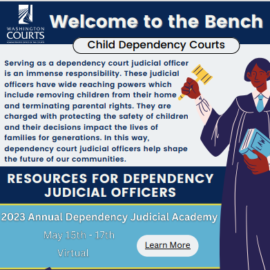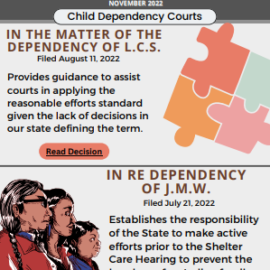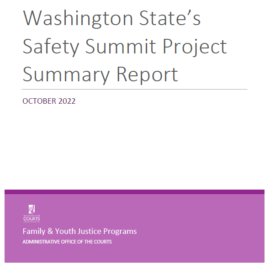For those of you who need a more visual enticement to get excited about Just Data January, please watch this campy welcome video – we can’t wait to see you! Welcome To Just Data January! Week 1: FTC BP 8, Provision A, Maintain Data Electronically In January 2023 our focus will be on Best Practice 8, Monitoring and Evaluation. “Provision A,” of Best Practice 8 is simple: effective courts collect data electronically. And luckily, if your court has started using
Welcome to the Bench Infographic
Recent WA Supreme Court Case Law Decisions Infographic
Washington State Safety Summit Project Summary Report
ECC Community Level Indicators
The ECC Community Level Indicators document summarizes the contextual community characteristics that may facilitate or impede successful implementation of the ECC. This approach lies within Durlak and DuPre’s ecological framework for effective program implementation, which was originally developed to promote implementation success of community-based health prevention programs. According to this approach, understanding the local environment in which the ECC is operating is important to successful implementation and sustainability of the program. If program staff identify the existing challenges that impact
Domestic Violence in Dependency Cases Infographic
Early Childhood Court (ECC) Enrollment Monitoring Tool
WA Guide to Reasonable & Active Efforts

As part of the preparation for the WA Judicial Academy on Reasonable & Active Efforts, FYJP pulled together a group of state experts to create the “WA Guide on Reasonable & Active Efforts”. This new resource provides a comprehensive overview of the applicable RCW’s and case law that pertain to making reasonable and active efforts findings in Washington State.
What Can Juvenile & Family Courts Do to Reduce Trauma?
National Council of Juvenile and Family Court Judges
Parents for Parents: Education and Engagement for Parents in Dependency
INNOVATION The Parents for Parents (P4P) program is a promising practice that provides peer outreach, engagement and education by Parent Allies, parents who have successfully navigated the child welfare system, to parents who are new to the dependency system.









